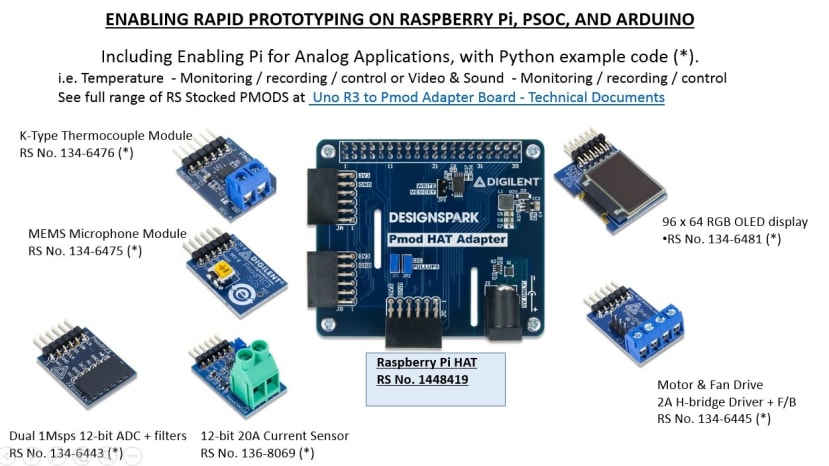PLUG IN Prototyping for Real World projects becomes reality with Pi's, Pythons, and PMODs
Follow articleHow do you feel about this article? Help us to provide better content for you.
Thank you! Your feedback has been received.
There was a problem submitting your feedback, please try again later.
What do you think of this article?
RS Components launches its DesignSpark branded PMOD HAT for Raspberry Pi, RS No. (144-8419) , to support the DesignSpark engineering community and the millions of developers and makers working with Pi today. Plug in peripheral modules enables rapid solderless prototyping, with Python code examples being made available to support key analogue functions.
According to a recent Aspencore report around 20% of all new projects start with a Dev kit. This is partly due to availability and increasing complexity of devices but is also due to increasing budget and time pressure on project teams to achieve prototype milestones faster in order to enable software development as early as possible in their project and hit market launch windows. In their survey, Aspencore also reported that Raspberry Pi is increasingly making its way into corporate level R&D projects with as many respondents reporting they were considering using Pi for their new projects as those working on proprietary platforms. This represents a 7% increase in current users and close to the leading figure of 27% using custom platforms. The Combination of Raspberry Pi, Arduino, and Beagle represented almost 50% of the form factors under consideration for next projects, with Pi by far showing the fastest growth.
While the availability of a manufacturer’s development kit provides the core functionality around the key device, adding desirable peripheral functions often means embarking on PCB design with resultant delays. In the FPGA World, this has been addressed for some time by Digilent’s peripheral modules, or PMODs, which are increasingly popular and being adopted by other microcontroller manufacturers who are adding standard PMOD ports to their development kits. As a leading Global Seller of Raspberry Pi, in association with Digilent Inc., RS Components is now launching its DesignSpark Branded PMOD HAT for Raspberry Pi, RS No. (144-8419) , to support their engineering community and the millions of developers and makers working with Pi today. This now sits alongside the Arduino/PSOC6 Shield, RS No. (136-8283) , where the full range of RS stocked PMODs and application documents are also listed).
The boards allow up to 3 PMOD devices, 5 on the Digilent boards like chipKIT Wi-FIRE PIC32MZ (134-6472) , to be plugged to the base platforms to rapidly incorporate peripheral functionality from a wide range of modules and progress projects without having to resort to solder, or wait for PCB spins.
Aspencore’s report also projects Python as the fastest growing embedded programming environment and now 3rd in popularity behind C and C++, so while Pi is world renowned for its role as a low-cost single board computer (SBC) helping to train the next generation of programmers, it’s lagged a little in “REAL WORLD” or Analogue peripheral functionality and applications. To address this along with the introduction of the “PiMOD” hat, RS is also announcing the availability of Python code and application cases to support a subset (*) of front-end sensors, and output devices, that will enable developers and enthusiasts to make a flying start for instrumentation and control projects.
Working with Andrew Back at Open AB Ltd, RS have commissioned examples which are now available to download from DesignSpark. Main documentation has been published on a popular site used for creating high-quality documentation for Python software. http://designspark-pmod.readthedocs.io where they are also available as PDF and Epub (e-book) downloads. The library has also been packaged and published to the Python Packaging Index (PyPi), which simplifies installation and updating. https://pypi.python.org/pypi/DesignSpark.Pmod/ download an archive via this page, but it's best to use "pip", as detailed in the documentation.Development is via GitHub: https://github.com/DesignSparkrs/DesignSpark.Pmod
To get your Rapid Prototyping Projects off to a flying start over the holidays, visit RS Components, or write to Santa for a Christmas Present.......
For Raspberry Pi
* Raspberry Pi3 RS No.
(896-8660)
* HAT for Raspberry Pi RS No.
(144-8419)
For Arduino
* chipKIT Wi-FIRE PIC32MZ MCU Board + WiFi RS No.
(134-6472)
* Pmod Uno R3 to Adapter Board RS No.
(136-8283)
For PSOC
* CY8CKIT-042 PSoC 4 Pioneer Dev Kit RS No.
(124-4183)
* New CY8CKIT-062-BLE PSoC 6 IoT Dev Kit RS No.
(136-7817)
* Pmod Uno R3 to Adapter Board RS No.
(136-8283)
ANALOG PMODS to try
(*) These 6 have Python Code for Raspberry Pi in Design Spark, all PMODS have other example codes available from Digilent.
* PmodOLEDrgb 96 x 64 RGB OLED display RS No.
(134-6481)
* Pmod ISNS20 12-bit 20A Current Sensor RS No.
(136-8069)
* PmodMIC3 MEMS Microphone Module RS No.
(134-6475)
* Pmod AD1 Dual 1Msps 12-bit ADC + filters RS No.
(134-6443)
* Pmod HB3 2A H-bridge Driver + F/B RS No.
(134-6445)
* PmodTC1 K-Type Thermocouple Module RS No.
(134-6476)
HAPPY HOLIDAY TINKERING FROM RS & DESIGNSPARK FOLKS!




